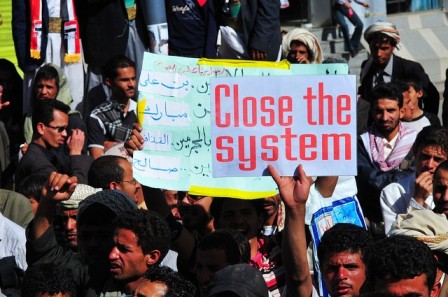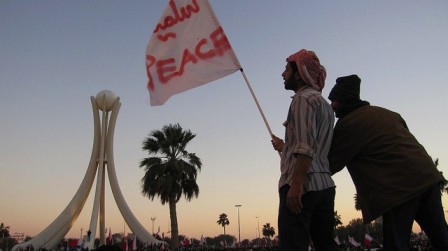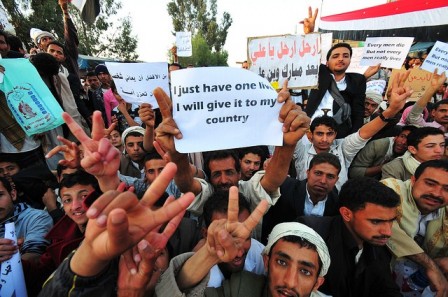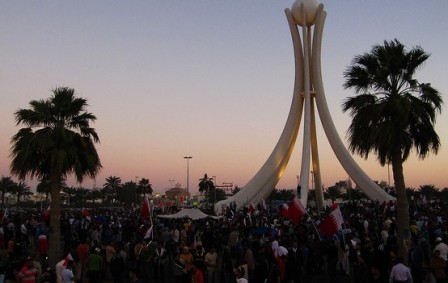Libya’s Intervention: A Message To Autocrats in Yemen, Bahrain, Saudi Arabia And Syria
The international coalition implementing the UN resolution 1973 imposing a no-fly zone over Libya started 10 days ago. While the outcome of the military operation is still undetermined and “fluid”, what is perfectly clear is that without the bombing of Gaddafi’s forces the Libyan rebels would have already been crushed. Despite all the uncertainties for Libya’s future, what should be obvious to anyone tracking the story of the Arab revolution is that the coalition attack gives the autocrats and kings of the region in Yemen, Bahrain, Saudi Arabia, Syria, Jordan, Morocco and even Iran a stern warning: If you decide to go on a murdering spree against your own population the international community will intervene.
Fog Of War And Muddy Narratives
Even so the UN resolution, pushed by France, the UK and Lebanon, didn’t get a no or veto vote at the UN Security Council with Russia, China, Germany and Brazil abstaining, several countries are now backtracking and switching narratives. It is notably the case for Russia and the Arab League. In Russia, Prime Minister Putin called the intervention a “crusade”, while his statement was quickly criticized by Russian President Medvedev. The Arab League, at the exception of Algeria and Syria, recommended a no-fly zone before the UN resolution, but is now flip-flopping by drawing comparisons between the war in Iraq and the UN authorized intervention in Libya.
Some critics, within the military community, are saying that the operation has a tactic but no strategy. Others, notably the global left, are painting it with broad brush strokes as an imperialist neo-colonialist operation hiding its true motives of another war-for-oil and meddling into Middle-East foreign affairs behind the claim of a humanitarian mission. This anti-imperialist discourse is simplistic for not taking into consideration the reality of the diplomatic battle which took place before the military operation, and also ignoring the paradigm change which is occurring in the region since the Jasmine Revolution in Tunisia.
The US media has also amplified this flawed analysis from the global left by its American centric coverage of the Libyan story which keeps portraying, inaccurately, the United States as the leader of the coalition. The drive to intervene in Libya was not under the impulse of the Obama administration but came about under intense international pressure from France and Britain. Two weeks ago, the US administration was deeply divided over the issue, with Defense Secretary Gates and NSA Clapper opposed to a military intervention and Secretary of State Clinton and UN ambassador Rice pushing for it.
Bottom line, President Sarkozy and Prime Minister Cameron won the diplomatic argument and are, politically, the ones in the driver seat. The opening salvo in the attack on Gaddafi’s forces was conducted by French jet fighters not American ones. President Sarkozy is still ahead of the game for having already recognized the Libyan National Council as Libya legitimate government. The United States is now saying that they want “someone else to assume the leadership”, but it is a leadership that the US never had as the Obama administration was playing a supporting role in the chain of events. But back to the global left, with personalities such as Amy Goodman from Democracy Now in the lead in the US, they have cornered themselves into a huge contradiction siding de-facto with a dictator such as Gaddafi against the Libyan revolution, and by extension the rest of the Arab revolutions still unfolding.
Meanwhile, the fog of war and muddy narratives are also at play in the Gulf. While the movement in Bahrain has similar goals (social justice, freedom of speech and democracy) than the ones in Tunisia, Egypt, Libya and Yemen, it is now described by Saudi Arabia and Bahrain as a sectarian conflict between Sunnis and Shia Muslims. It is a convenient way for Bahrain’s king to justify a brutal crackdown on protesters, and also a justification for Saudi Arabia to invade Bahrain with tanks. In this distorted narrative, the Shia majority of Bahrain population (75 percent) has become a “proxy of Iran”. This Saudi narrative is not only convenient for local consumption within Saudi Arabia, but it is also well received in Israel and in US neo-con circles which still think attacking Iran is a good idea. If this Saudi narrative finds a wider audience, it would have disastrous consequences for an Arab revolution which in order to succeed must unite Sunnis and Shia Muslims.
Editor’s Note: Photographs of protests in Yemen and Bahrain courtesy of Al Jazzeera English photo stream.
Related Articles

















5 Responses to Libya’s Intervention: A Message To Autocrats in Yemen, Bahrain, Saudi Arabia And Syria
You must be logged in to post a comment Login